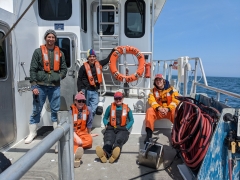Knauss legislative fellowships in Congress help build careers — and they're fun and educational. See our video and fact sheet for details.
Failure is an Option: The Rewards and Challenges of Fieldwork
As the first fish trawl is reeled in, everyone feels excited for what we might catch. It’s August and we’re several miles offshore from the mouth of the Chesapeake Bay, where the water has turned from estuarine green to deep blue. The infinity of the open ocean somehow seems to have suddenly engulfed us. The months of planning are finally behind us: picking out sampling stations, writing proposals, selecting and preparing gear, and gathering collection permits. Even though the net has only been deployed for five minutes, it feels like five hours. We drag the cumbersome equipment aboard, full of anticipation, only to find an empty net. No problem, maybe the trawl didn’t hit bottom. We try again but the second deployment isn’t much better, turning up a handful of sassy sea robins and squid. It’s all right, little to no catch is still data.

Our second location, however, doesn’t fare much better. Maybe fish are sparse in this area of the sampling region. Maybe the fish just ain’t bitin’ today. Unfortunately, the opportunity to try sampling elsewhere never arrives. A failure of one of the boat’s engines turns us around. The next day, bad weather keeps us from going out altogether. Eventually, we make the prudent decision to make our way home.

Fieldwork is one of the most challenging, rewarding, and exciting parts of marine science. Many ecologists choose this career because it allows them to be outside and in spaces they love. Yet, fieldwork often proves to be one of the most frustrating parts of the job. Everything can be planned nearly to perfection, only for random chance or plain bad luck to step in and mess it up. This phenomenon is one of the most notorious unwritten rules of science, translating into almost any discipline. A lot of the time, experiments just don’t work out how you planned, whether that be in the field, the lab, or back in the office looking at the data. Failure is an important and inevitable part of the scientific process.
The silver lining to all this comes in several forms. Young scientists quickly recognize that problem-solving is an essential skill that arises. (It also happens to be a very useful life skill in general.) After returning home from a disappointing week of fieldwork, we were able to coordinate with other researchers who were collecting fish in the same area. They were immensely generous in gathering some samples for us. The capacity to recover, sometimes through the goodwill of others, is just as important as any other skill.

The other redeeming aspect of failure is that, when things do go right, it makes them that much sweeter. We recently returned to our study site at the mouth of the Bay, this time with boat engines fixed, the promise of good weather, and some adjustments made to our trawl protocol. I was hopeful but nervous knowing that my dissertation work, in part, depended on finding some success. I was also comforted by the thought that no matter what happened, we would find a way to adapt and overcome. Thankfully, we pulled up full nets at almost every station this time.
As I move forward in my life and career, I often feel inexperienced and overwhelmed, unsure of whether I’ll be able to accomplish everything I’ve planned to do with my degree. Many people—not just graduate students—feel this way of course. But the humbling experiences I’ve had in the aftermath of failure, many of which were not as positive as this story, give me the confidence to continue on, to look to my community for support, and to try to help others when they encounter failure as well.
Top Left Image: Part of our research crew during our first cruise aboard the RV Rachel Carson. Photo: Matt Stefanak
See all posts to the Fellowship Experiences blog

